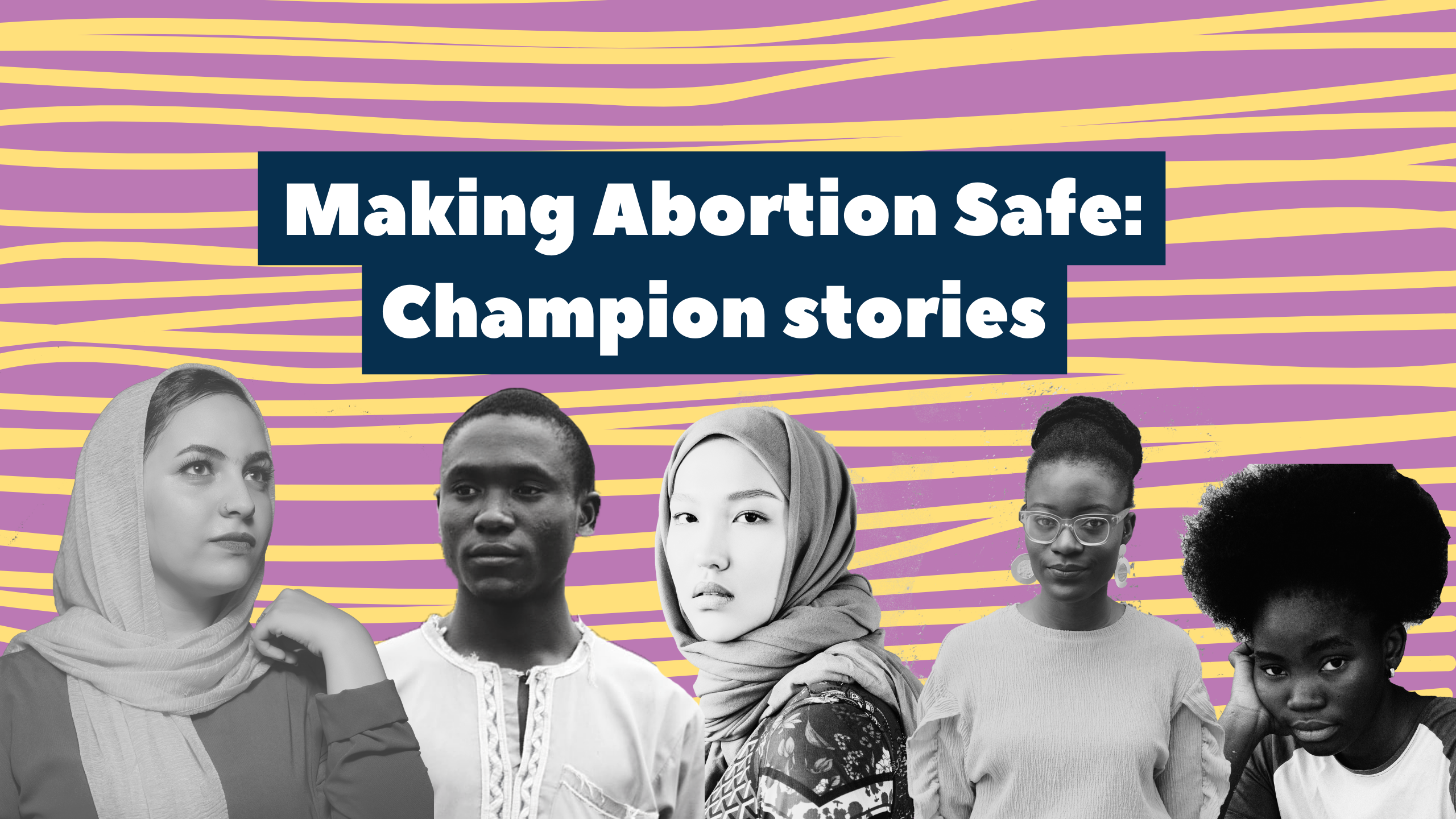
The RCOG’s Making Abortion Safe programme supports healthcare professionals to address the barriers to safe abortion and post-abortion care for women and girls globally. The programme works with some extraordinary sexual and reproductive health and rights champions from Nigeria, Rwanda, Sierra Leone, Sudan and Zimbabwe, who advocate to increase access to safe abortion care and post- abortion care.
To mark this year’s International Safe Abortion day, we are highlighting the work of a few of our champions.
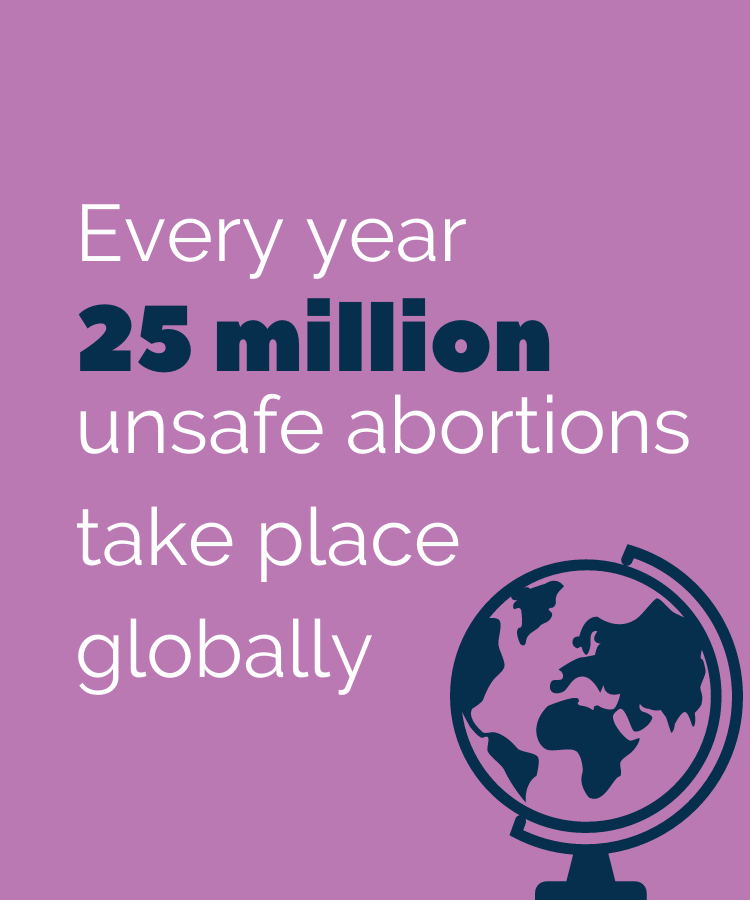
" Although safe abortion services are available in Nigeria, many people do not know this. A lack of information is a significant barrier women face.
Abortion services have been so revolutionised. In theory, a woman can diagnose a pregnancy in the comfort of her own home, have a medical abortion, and she can even assess herself to know when the abortion is completed.
An important component to expanding safe abortion care is abortion law reform and healthcare as it occurred in Britain in the case of the Rex V Bourne in 1938. In this instance, it was a medical doctor who voluntarily provided services despite the fact that the law in Britain was restrictive at the time. The jury found that the surgeon did not have to wait until the patient was in danger of immediate death, but it was his duty to perform the operation if, he believed that the consequence of continuing the pregnancy would damage the girls physical and mental health.
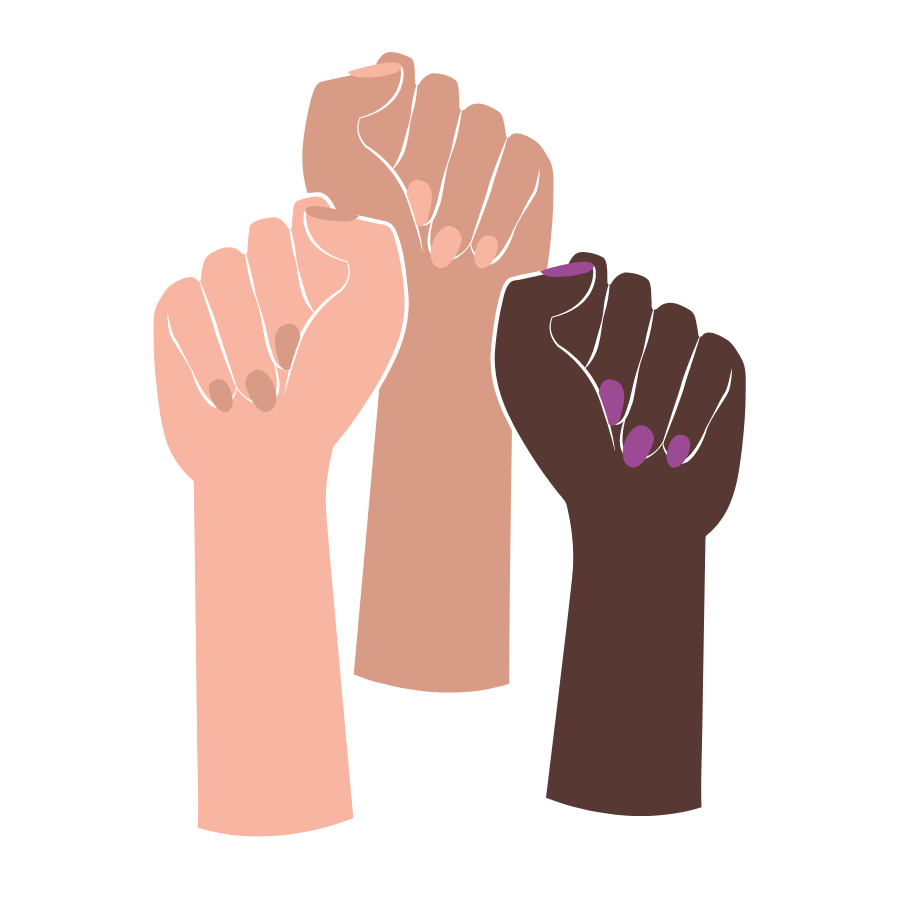
Providers can play an important role in this and challenge current provisions. But law reform for abortion is challenging, because of the culture and religion. However, we can try to get individuals from different backgrounds, including healthcare providers, religion and traditional leaders, women groups and legislators to better understand the importance of safe abortion access through awareness raising and values clarification training. People need to understand that safe abortion care saves lives.
A study conducted in Lagos state found that maternal mortality rates are as high as 40-50% and that of all the maternal mortality causes, unsafe abortion came out on top. This will be similar in many parts of the country. Sexual and reproductive healthcare professionals need to be advocates for safe abortion care to reduce the high mortality rates that are associated with unsafe abortions.
When value clarification workshops (a training addressing abortion stigma as the root cause of barriers to safe abortion service delivery) are conducted for healthcare providers, as well as training them on newer methods of safe abortion services, it will increase access and reduce mortalities from unsafe abortion.”
" I am the director of the Adult Rape Clinic (ARC). Our daily work is to support women, survivors of sexual violence that walk through our doors, some of them are pregnant and most of the time, they do not want to carry this pregnancy. So every day we support women, we tell them about their options and explain what the law says.
We accompany survivors of sexual violence who choose to have an abortion, and we ensure that the process is fast, because we understand the psychological trauma that they are going through.
One of the things that made me want to be passionately involved in safe abortion work was the fact that I understood these women. Understanding the desperation, regardless of whether this woman is married or in a relationship. I understand that this desperation sometimes comes when they are just not ready to carry the pregnancy, have a child or commit to the relationship.

I'm an activist and I'm a passionate believer of women's bodily autonomy. A key pillar and a fundamental belief to my activism is that women should own their bodies, regardless of who they are or where they are. Healthcare professionals are first responders when things go wrong. As a result, they witness the sad realities of what happens when women have undergone unsafe abortions. Knowing this, it is important for healthcare professionals to be advocates and to be on the forefront of improving access to safe abortion care.
Healthcare professionals who understand why it is important for women and girls to access safe abortion services can talk to their peers, so that they also understand and maybe change their attitudes. They need to understand that these women and girls need support, they need their help when they walk in. We need to debunk abortion myths in health facilities to provide the best support to women and girls.
It is important for healthcare professionals to be respected and trusted within communities. We need to be able to explain that there is a safe procedure available to women."
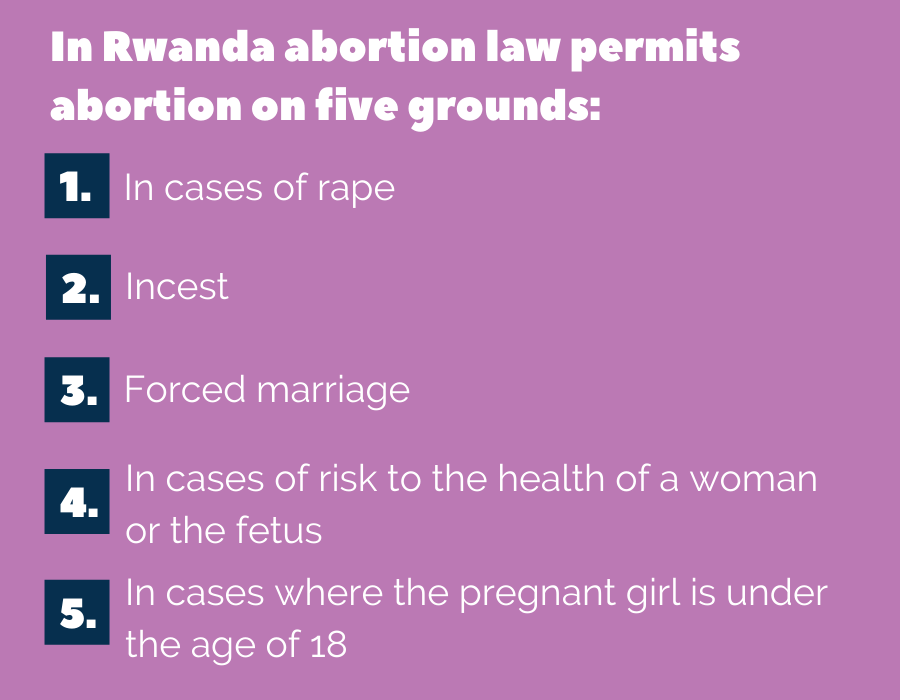
"It is difficult for women to access safe abortion due to cultural and religious stigma. Some hospitals with religious affiliations still do not provide safe abortion care. Healthcare professionals within these hospitals are reluctant to provide safe abortion care because of their values and beliefs, and might not be comfortable with their own skills and knowledge to perform safe abortion.
However, there is a political will in Rwanda. The President of the Republic has granted a pardon three times to women who were convicted for having an abortion.
The 2019 ministerial order that clarified and expanded the Rwandan abortion law, has improved access to safe abortion for women and girls in Rwanda. As a result of the ministerial order, guidelines have been developed for healthcare professionals, which has helped medical doctors in Rwanda feel confident about providing safe abortion care. The clarity from the ministerial order has also made women, who would previously have feared what the response might have been, more confident to request an abortion from a healthcare provider.”

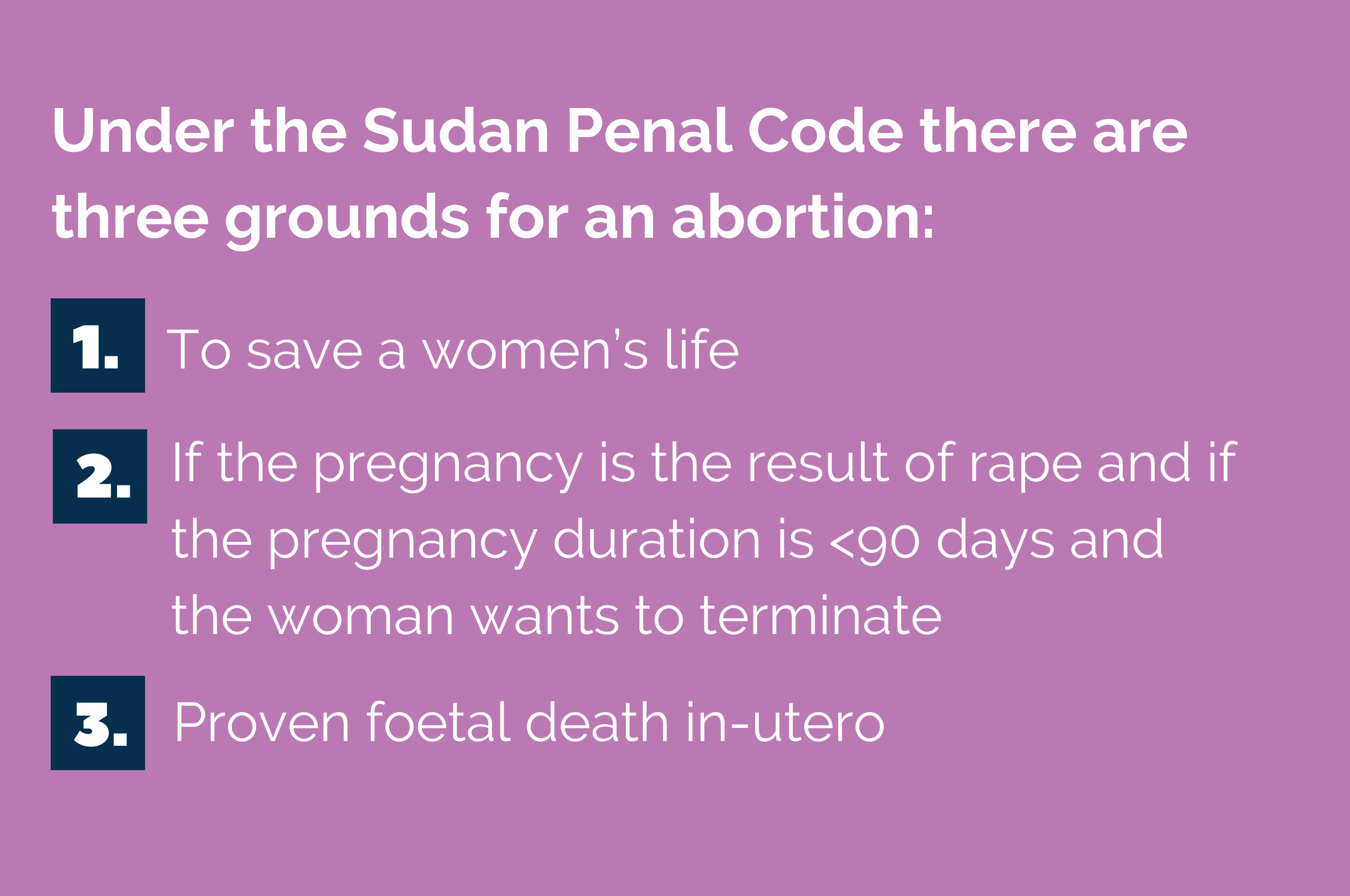
The first ground for abortion requires a specialist medical assessment and signature. The ground for termination after rape requires filing police charges, obtaining a police form and a court order allowing the abortion. Sadly, the flawed rape legislation, the legal ban on sex outside marriage and the 90 days’ time limit on abortions, make it almost impossible for people to access safe, legal abortion after rape.
A lot can be done to expand access to safe abortion in Sudan. Provision of non-judgmental women-centred comprehensive abortion care should be the standard, where confidentiality and privacy is guaranteed.
Legal reform
Legislative and policy reforms are needed to make abortion safe in Sudan. We need urgent legislative reform to remove the time-limit for obtaining abortion after rape; rape laws need to be improved; and protective laws against gender based violence. The penal code should be reformed to expand the legal grounds for safe abortion care, including to preserve the physical and mental health of the women or girl, along with economic, and social grounds given the increased poverty. Police presence in maternity wards should be stopped.
Development of policies and guidelines
Clear policy and guidelines on safe abortion and post abortion care should be developed, clearly emphasising no patients seeking care should be reported to the police. Youth-friendly sexual and reproductive health services and comprehensive sexuality education should be introduced
Register and make available misoprostol and mifepristone – drugs used to induce abortion - for safe abortion and post-abortion care management
There should be fewer restrictions on and more access to misoprostol, especially with accumulative evidence that self-administered abortion with the pills are safe and effective. Mifepristone should be registered to improve abortion outcomes.
Task shifting
There needs to be more mid-level health care professionals providing abortion care. In the large and disbursed Sudan, usually lower level healthcare professionals are the ones giving care in the rural areas constituting 70.2% of population. General practitioners, midwives, medical officers, health visitors, and medical assistants can be trained on appropriate methods to provide safe abortion and PAC services. Training on comprehensive abortion care should be included in medical schools and training curricula.
Data collection
Information and data related to maternal mortality, unsafe abortion, PAC, contraception, and other SRH services should be made accessible to the public.
Community dialogue
In this post-revolution era of civic freedoms and increased mobilisation, there is a great chance for us to improve the health and rights of women and girls in Sudan. Conversations about the impacts of unsafe abortion on the society and the state should be held. These should highlight the economic cost of unsafe abortion and effect on Sudanese economy, bodily integrity, women’s rights, and contraceptive access."
“I became an advocate for sexual reproductive health rights because I have witnessed so many sad cases. As someone who works within the community, I have heard and seen cases of unsafe abortion taking place and young people losing their lives. Sexual assaults, especially rape are unfortunately common in my community and often lead to unwanted pregnancies and women and girls having no other choice than to seek an unsafe abortion.
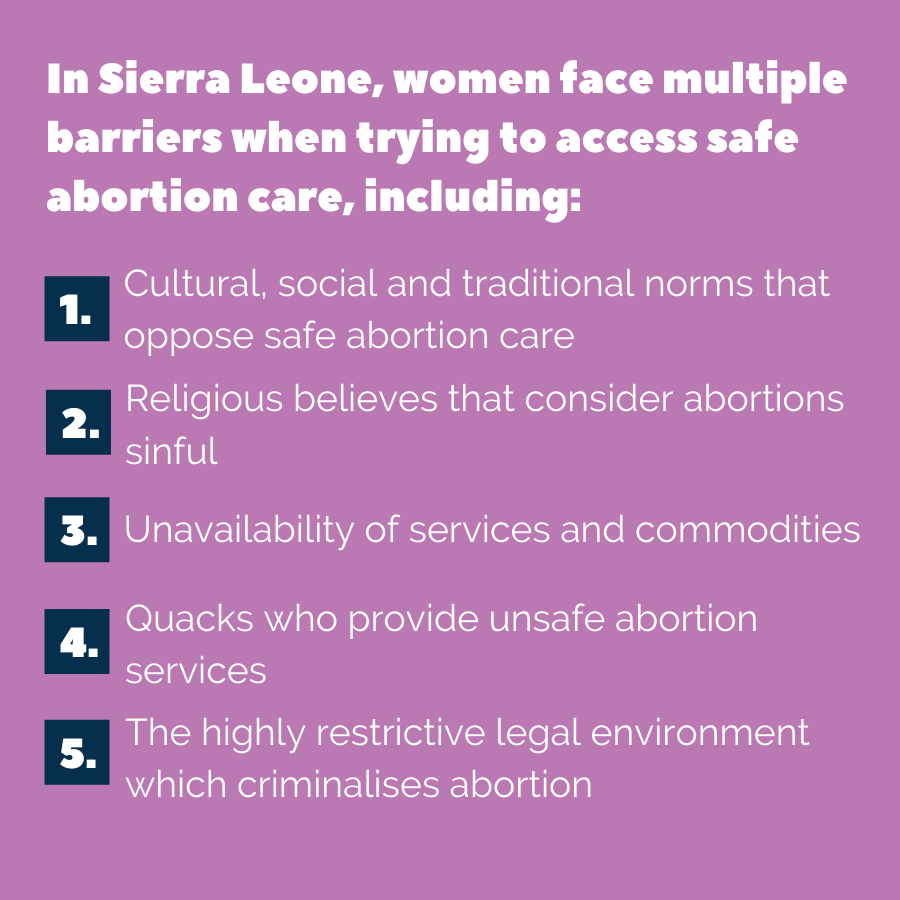
To make abortion safe in Sierra Leone, we need to train health workers on how to provide safe abortion care. Education amongst the general public is needed to inform them about the importance of safe abortion access and more contraception must be made available to help prevent unintended pregnancies. Lastly, we need to promote sex education in schools.
I strongly believe that tackling the biases of health professionals about abortion care, though education and awareness raising, will help healthcare professionals greatly in addressing barriers to safe abortion care.”
